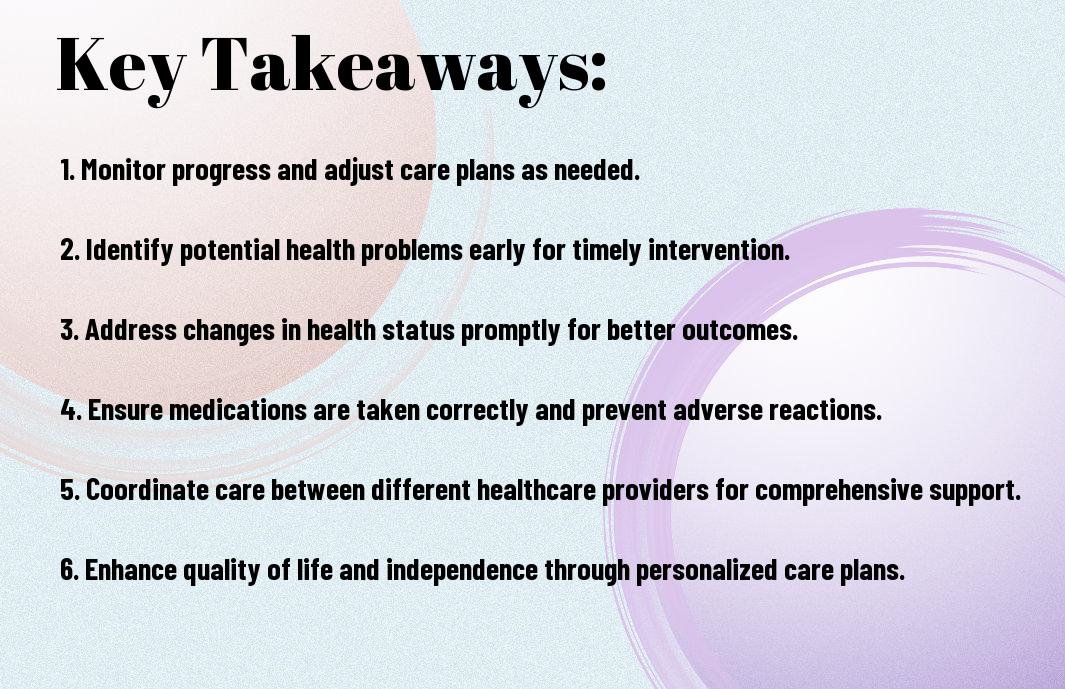
You may wonder why regular home health evaluations are crucial for your well-being. These assessments play a vital role in monitoring your health status, identifying potential issues early on, and ensuring optimal care for you or your loved ones. By keeping track of your health regularly in the comfort of your home, you can prevent serious health complications and receive appropriate treatment promptly. Learn why these evaluations are key to maintaining your health.

Key Takeaways:
- Early Detection: Regular home health evaluations can help in early detection of health issues, allowing for timely intervention and treatment.
- Preventative Care: These evaluations enable healthcare providers to identify potential risks and provide preventative care to maintain overall well-being.
- Improved Quality of Life: By monitoring health status regularly, individuals can work towards improving their quality of life and address any concerns promptly.

The Importance of Preventive Care
Identifying Potential Health Risks
Before delving into the specifics of why regular home health evaluations are crucial, it is paramount to recognize the significance of preventive care in Patient Safety and Quality in Home Health Care. One crucial aspect of preventive care is identifying potential health risks before they escalate into serious problems. Through regular evaluations, healthcare professionals can assess a patient’s current health status, identify any underlying issues or risk factors, and take proactive measures to address them.
Reducing Hospital Readmissions
On top of identifying potential health risks, preventive care through regular home health evaluations plays a significant role in reducing hospital readmissions. Hospital readmissions can be costly, disruptive, and even risky for patients, especially those with chronic illnesses or complex medical needs. By closely monitoring a patient’s health status and providing timely interventions, healthcare providers can significantly lower the chances of hospital readmissions.
A proactive approach to healthcare, including regular home health evaluations, not only enhances the quality of care but also improves patient outcomes and satisfaction. By focusing on preventive measures and early interventions, healthcare professionals can effectively manage chronic conditions, prevent complications, and promote overall well-being for their patients.

Early Detection of Chronic Conditions
The Why is Signify Health calling me? The value of In-Home Health Evaluations article stresses the importance of early detection of chronic conditions through regular home health evaluations. By identifying underlying health issues sooner rather than later, individuals can take proactive steps to manage their conditions and prevent further complications.
Diabetes and Blood Sugar Management
One of the chronic conditions that can be detected early through home health evaluations is diabetes. Regular monitoring of blood sugar levels is crucial for individuals with diabetes to prevent serious complications such as heart disease, kidney failure, and nerve damage. By identifying any fluctuations in blood sugar levels early on, individuals can adjust their medication, diet, and lifestyle habits to better manage their condition and improve their overall health.
Hypertension and Cardiovascular Health
Blood pressure is another vital indicator that can be monitored during home health evaluations to detect hypertension early. High blood pressure is often referred to as the “silent killer” because it typically has no symptoms but can lead to serious health issues such as heart disease, stroke, and kidney damage if left untreated. Regularly monitoring blood pressure levels at home can help individuals and their healthcare providers make informed decisions about treatment plans, lifestyle changes, and medication adjustments to control hypertension and reduce the risk of cardiovascular complications.
The early detection of hypertension through home health evaluations not only allows for timely intervention and management but also empowers individuals to take control of their cardiovascular health and make positive changes to their overall well-being.
Fall Prevention and Home Safety
Assessing Home Hazards
For older adults, falls can have serious consequences, leading to fractures, head injuries, or other complications. Assessing home hazards is crucial to prevent falls and ensure the safety of individuals living independently. Professionals conducting home health evaluations will carefully examine the living space for potential risks such as loose rugs, poor lighting, cluttered walkways, or slippery floors. By identifying these hazards, caregivers can make necessary modifications to create a safer environment.
Implementing Safety Measures
Hazards such as uneven steps, lack of handrails, or inadequate bathroom equipment can significantly increase the risk of falls at home. To address these issues, caregivers can implement safety measures such as installing grab bars in the bathroom, securing loose carpets, or improving lighting in dimly lit areas. Identifying and correcting these hazards can prevent accidents and injuries, enhancing the overall well-being and quality of life for individuals receiving care at home.
The implementation of safety measures is crucial in reducing the likelihood of falls and ensuring a safe living environment for individuals in need of care. By addressing potential hazards proactively, caregivers can create a secure and supportive setting that promotes independence and prevents accidents.
Mental Health and Cognitive Function
To maintain overall well-being, it is crucial to consider mental health and cognitive function in home health evaluations. Mental health plays a significant role in a person’s quality of life and can impact their physical health. Cognitive function is important for daily activities and maintaining independence, especially in older adults. Regular evaluations can help detect any issues early and ensure appropriate interventions are put in place.
Recognizing Signs of Depression
Health evaluations should include screening for depression as it can often go unnoticed but significantly impact an individual’s daily life. Signs of depression can include persistent sadness, lack of interest in activities, changes in appetite, and difficulty sleeping. It is important to address these symptoms promptly, as untreated depression can lead to worsening physical health and even suicidal thoughts.
Supporting Cognitive Health
On a cognitive level, it’s crucial to assess memory, reasoning skills, and overall cognitive function during home health evaluations. Early detection of cognitive decline, such as in cases of Alzheimer’s disease, can help in providing appropriate care and support for the individual. Additionally, engaging in activities that stimulate the brain, such as puzzles or learning new skills, can help maintain cognitive function and delay decline.
Recognizing changes in mental health and cognitive function is important for overall well-being and quality of life. By including assessments for depression and cognitive health in regular evaluations, healthcare providers can detect issues early and implement interventions to support the individual’s needs.
Nutrition and Meal Planning
Now, regular home health evaluations play a crucial role in ensuring patients’ overall well-being. According to The Vital Role of Home Health Assessments in Patient Care Across the USA, one significant aspect of these assessments is nutrition and meal planning. Proper nutrition is vital for maintaining good health and preventing diseases, making it an integral part of home health evaluations.
Healthy Eating Habits
The establishment of healthy eating habits is vital for individuals undergoing home health evaluations. These assessments provide a platform to educate patients on the importance of a balanced diet and its impact on their well-being. By emphasizing the consumption of nutrient-rich foods like fruits, vegetables, whole grains, and lean proteins, healthcare providers can help patients improve their overall health and quality of life.
Meal Planning for Chronic Conditions
Eating a well-rounded diet is especially crucial for individuals with chronic conditions such as diabetes, hypertension, or heart disease. Meal planning for these conditions goes beyond just calorie counting; it involves carefully selecting foods that can help manage symptoms, prevent complications, and improve overall health. Healthcare providers conducting home health evaluations can work with patients to create personalized meal plans that cater to their specific dietary needs and health goals.
It is imperative to consider factors such as carbohydrate intake, sodium levels, and portion control when planning meals for individuals with chronic conditions. By addressing these concerns during home health evaluations, healthcare providers can empower patients to make informed choices about their nutrition and take control of their health outcomes.
What Are the Benefits of Regular Home Health Evaluations and Why Are They Essential?
Regular home health evaluation tips can provide vital insight into your overall well-being. These evaluations can detect health issues early, leading to timely treatment. They also allow for personalized health management plans to be developed, promoting a proactive and preventive approach to healthcare. Regular assessments are essential for maintaining optimal health.
Medication Management and Adherence
Not adhering to medication regimens can have serious consequences for individuals managing chronic conditions or recovering from illnesses. Managing multiple medications can be overwhelming, leading to missed doses, incorrect dosages, or dangerous drug interactions.
Simplifying Medication Regimens
Regimens that involve taking multiple medications at different times of the day can be confusing. Simplifying medication regimens by aligning dosages and schedules can improve adherence. This might involve working with a healthcare provider to adjust timings or consolidate medications.
Strategies for Improving Adherence
The key to improving medication adherence is education and communication. Healthcare providers should take the time to explain the importance of each medication, potential side effects, and the impact of non-adherence. Support from caregivers and use of pill organizers can also help individuals stay on track with their medications.
Simplifying medication regimens by consolidating doses, providing clear instructions, and utilizing tools like pill organizers can greatly improve adherence rates among patients. It is crucial for healthcare providers to regularly assess medication management during home health evaluations to ensure that individuals are managing their medications effectively.
Final Words
With this in mind, it is clear that regular home health evaluations play a crucial role in monitoring the health and well-being of individuals, especially those with chronic conditions or the elderly. These evaluations help healthcare providers to assess the progress of treatments, address any emerging health concerns, and modify care plans accordingly. By staying proactive and vigilant through regular evaluations, individuals can maintain their independence, manage their conditions effectively, and potentially prevent health crises.
Ultimately, the significance of regular home health evaluations cannot be overstated. They serve as an vital tool in ensuring that individuals receive the necessary care and support to lead healthier and more fulfilling lives. With the guidance and expertise of healthcare professionals, individuals can navigate various challenges and barriers to health effectively. By prioritizing regular evaluations, individuals can take proactive steps towards better health outcomes and improved quality of life.
FAQ
Q: What are home health evaluations?
A: Home health evaluations are assessments conducted by healthcare professionals to evaluate a patient’s health status in the comfort of their own home.
Q: Why are regular home health evaluations vital?
A: Regular home health evaluations are vital to monitor the patient’s health status, manage chronic conditions, prevent hospital readmissions, and ensure overall well-being.
Q: How often should home health evaluations be conducted?
A: The frequency of home health evaluations depends on the patient’s health condition and needs. In general, they are recommended at least every 60-90 days or as advised by the healthcare provider.
Q: What can patients expect during a home health evaluation?
A: During a home health evaluation, patients can expect a comprehensive assessment of their physical health, medication management, pain levels, mobility, mental health, and any other areas of concern.
Q: Who conducts home health evaluations?
A: Home health evaluations are conducted by a team of healthcare professionals, including nurses, therapists, and medical social workers, who are trained to assess and address the patient’s needs.
Q: What are the benefits of regular home health evaluations?
A: The benefits of regular home health evaluations include early detection of health issues, personalized care plans, improved quality of life, and better coordination of care between the patient, caregivers, and healthcare providers.
Q: How can patients and caregivers prepare for a home health evaluation?
A: Patients and caregivers can prepare for a home health evaluation by gathering relevant medical information, creating a list of questions or concerns, ensuring a safe and comfortable environment, and actively participating in the evaluation process.


No Comments